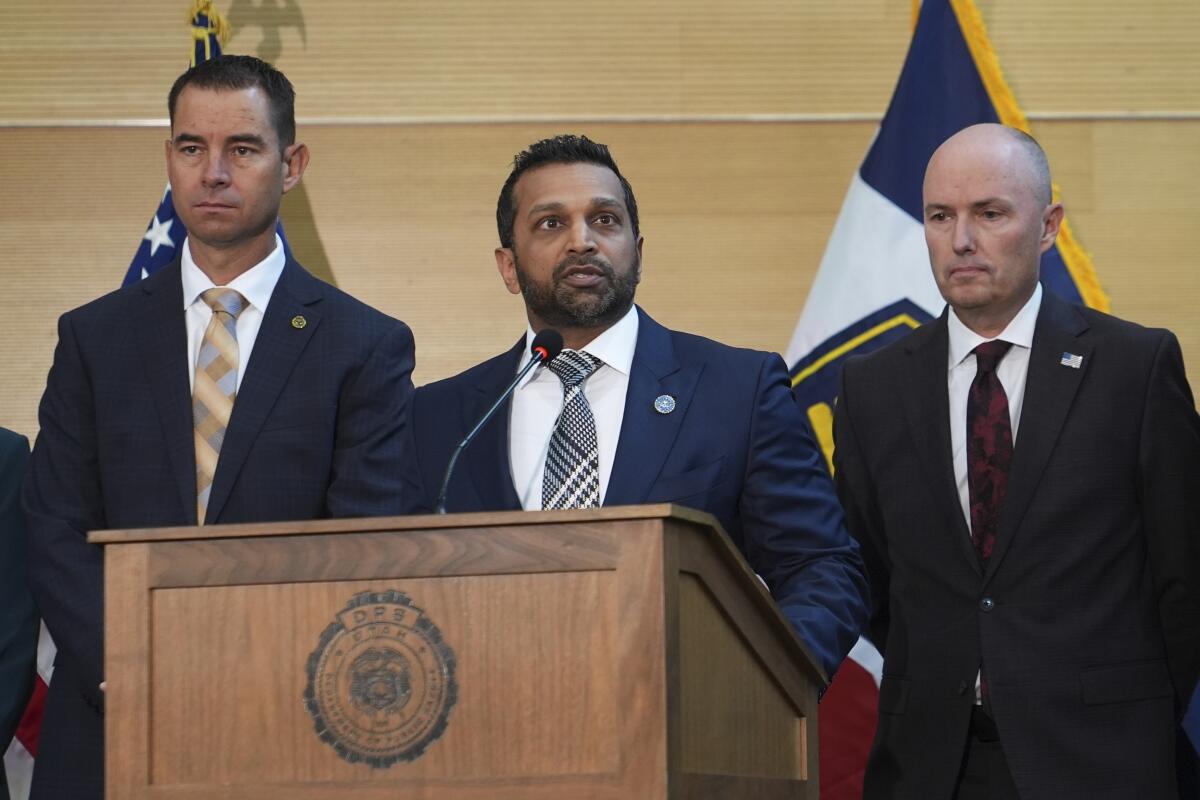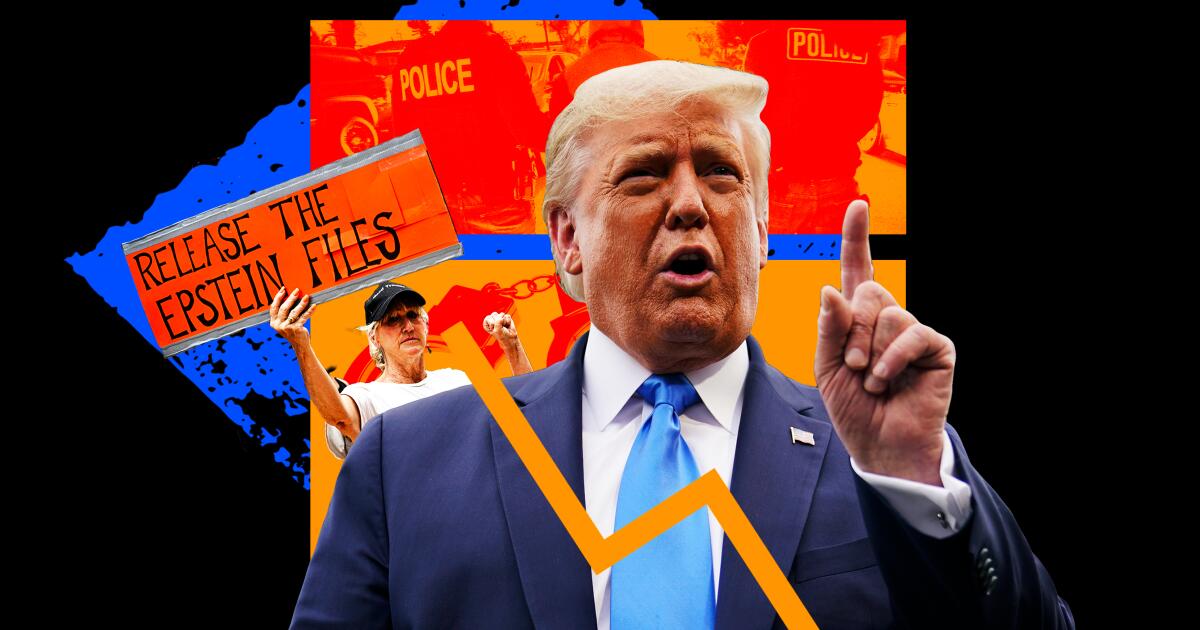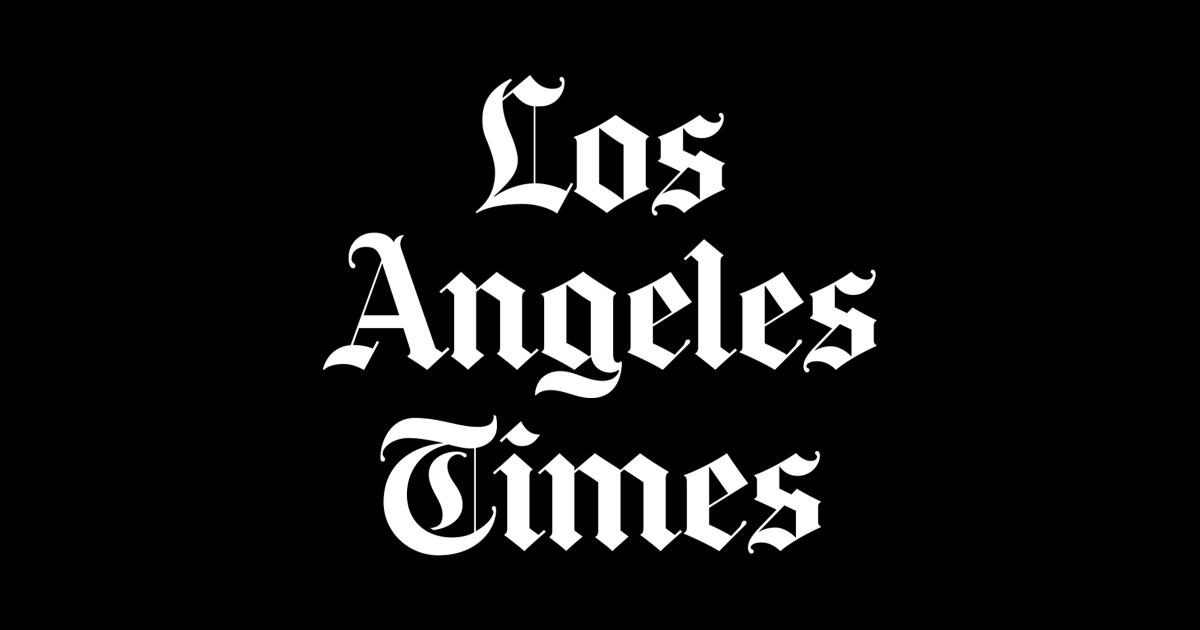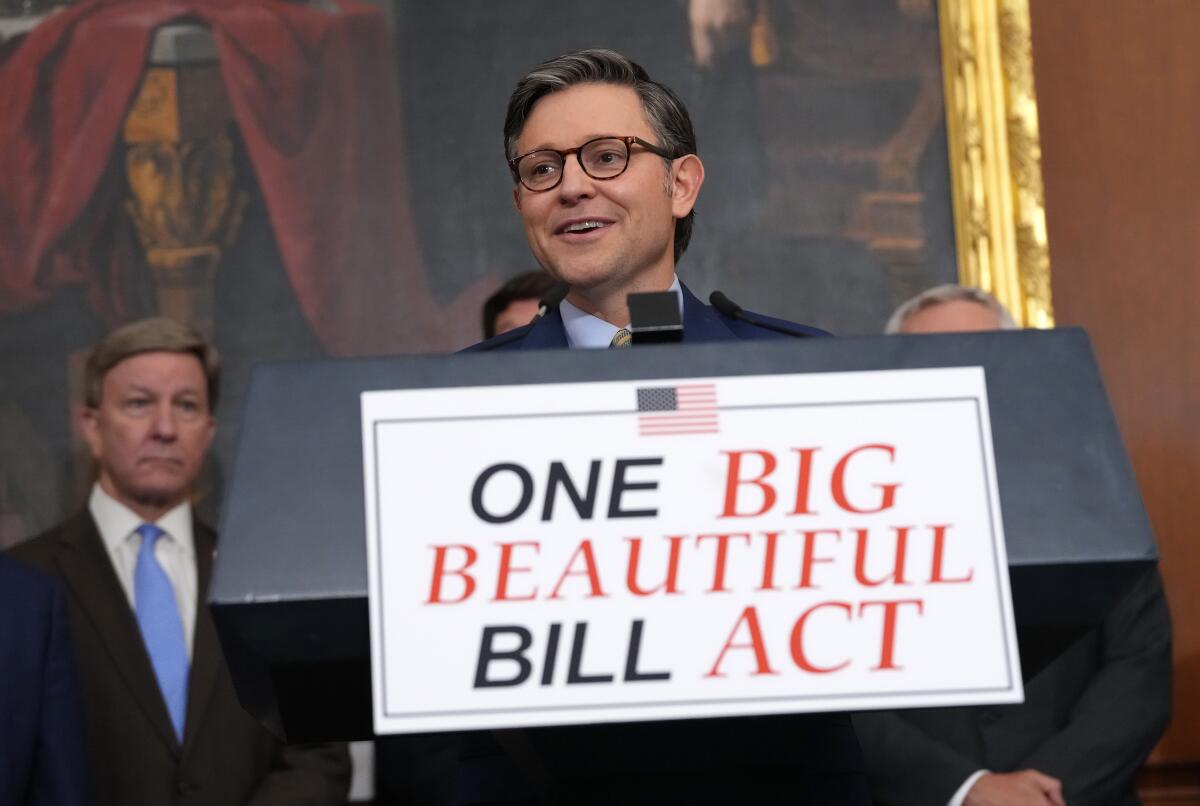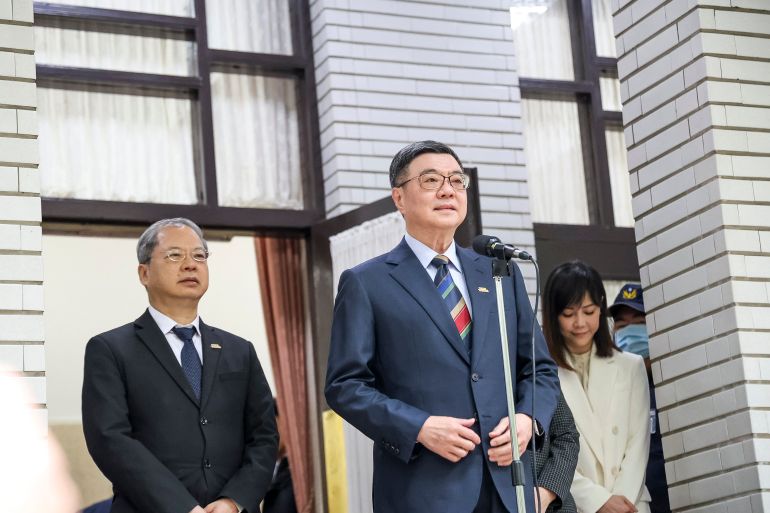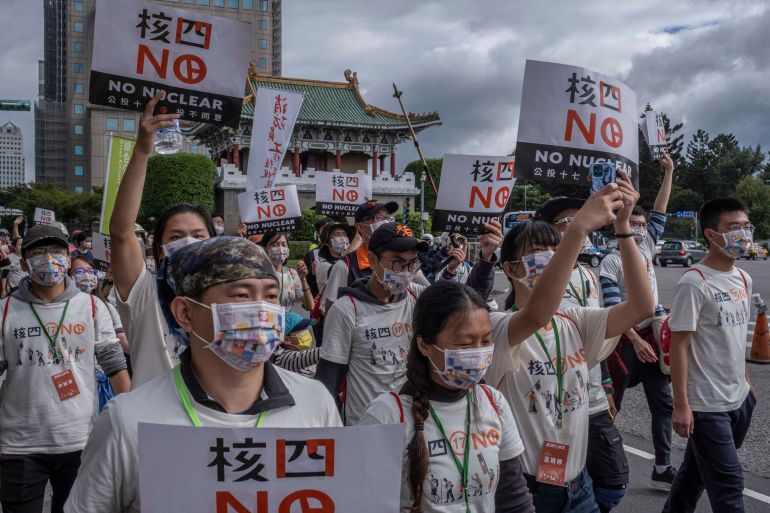FBI Director Kash Patel fights growing doubts over his competence
WASHINGTON — Of all the investigations underway by the FBI, the case of Charlie Kirk’s killing is one that President Trump’s allies expect the bureau to get right. Yet its director, Kash Patel, has struggled out of the gate.
Newsletter
You’re reading the L.A. Times Politics newsletter
George Skelton and Michael Wilner cover the insights, legislation, players and politics you need to know in 2024. In your inbox Monday and Thursday mornings.
You may occasionally receive promotional content from the Los Angeles Times.
A series of missteps
He posted misleading updates of the manhunt for a suspect on social media, blaming “the heat of the moment” in testimony before a Senate panel on Tuesday. He failed to coordinate his messaging internally with Justice Department leadership. Instead of returning to headquarters, Patel dined at an exclusive restaurant in New York as the search unfolded. And after a suspect was apprehended, Patel joined Fox News to share unprecedented details.
It was a series of missteps viewed in law enforcement circles as rookie errors, reflective of a director in over his head.
Trump has publicly stood by Patel in recent days. But leading voices in the MAGA movement have wondered aloud whether it is time for Patel to be removed, and top officials at the White House and Justice Department are reportedly questioning his future at the bureau. The president has also installed another loyalist in a top deputy position at FBI headquarters, raising questions over his plans.
Kash Patel discusses the hunt for Charlie Kirk’s killer at a news conference Friday in Orem, Utah, joined by Utah Department of Public Safety Commissioner Beau Mason, left, and Utah Gov. Spencer Cox.
(Lindsey Wasson / Associated Press)
The renewed spotlight on Patel comes amid suspicion in right-wing circles the director is suppressing the release of files from the investigation of Jeffrey Epstein, a notorious sex offender, at Trump’s direction. And last week, former bureau officials filed a lawsuit against the administration accusing the White House of exerting extraordinary political influence over the FBI, issuing loyalty tests for agents to determine their support for Trump.
On Saturday, Trump told Fox News that he was “very proud of the FBI,” praising the agency for ultimately catching the suspected killer. “Kash — and everyone else — they have done a great job,” he added.
“In normal times, any run-of-the-mill president of either party would certainly have serious concerns with keeping Patel around,” said Douglas M. Charles, a professor and FBI historian at Penn State Greater Allegheny, characterizing Patel as historically unqualified for the role. “Of course, we are not living in normal political times.”
Patel’s job sustainability, Charles said, “rests not on whether he is competent, but exclusively on whether President Trump is satisfied with him.”
“Patel is not acting as an independent FBI director,” Charles added, “the standard we have historically had since 1973.”
Jeopardizing the Kirk case?
Justice Department officials reacted with alarm after Patel shared the content of text messages from the suspect in Kirk’s shooting, revelations that got out front of official court filings.
“Why are we reluctant to share the details of the investigation itself, and comment on the case?” Jeff Gray, the Utah County attorney, said Tuesday, outlining state charges against the murder suspect. “Because I want to ensure a fair and impartial trial.”
“I can’t talk about details at all,” said Pam Bondi, the U.S. attorney general, asked for insight into the case in a Fox News interview on Monday.
The episode drew harsh rebuke from Democrats on Capitol Hill this week, where Patel was scheduled for hearings with the House and Senate judiciary committees. “Could I have been more careful in my verbiage?” he mused, before facing a slew of questions from lawmakers.
But Patel fiercely defended himself, repeatedly citing his experience as a prosecutor in the national security division of the Justice Department, and later at the Office of the Director of National Intelligence and at the Defense Department.
“I’m not going anywhere,” Patel told the Senate. “If you want to criticize my 16 years of service, please bring it on.”
Rhodri Jeffreys-Jones, a professor emeritus and FBI historian at the University of Edinburgh, said that precedent exists of public officials undermining the prosecution of high-profile cases, sometimes with devastating consequences. “The Patel remarks and actions may well prejudice the trial of Tyler Robinson,” he said, referencing Kirk’s murder suspect.
On Capitol Hill, Patel said his social posts and media appearances were in service of transparency with the American people. But the charges, trial, and evidence in the case are all public, said Norm Eisen, co-founder of the States United Democracy Center and counsel for the House Judiciary Committee during Trump’s first impeachment trial.
“Patel’s appointment as FBI director raised red flags from the start, mainly because of his lack of relevant experience and his partisan background. What we’ve seen in recent days has only reinforced those concerns,” Eisen said.
“The Utah County attorney leading the prosecution knew better than to comment on Patel’s speculative claims, correctly pointing out that it was necessary to preserve an impartial jury,” he added. “Making political speeches about the case undermines the integrity of the process and jeopardizes the prosecution.”
Political litmus tests
In a heated exchange with Patel this week, Sen. Adam Schiff, a Democrat from California, asked the director whether anyone from the bureau had been terminated or disciplined “in whole or in part” for being assigned to work on investigations of Trump in recent years. Trump was ultimately charged with federal crimes over his efforts to overturn the 2020 presidential election and his handling of highly classified documents.
“Anyone that was terminated at the FBI was done so for failing to meet their standards, uphold their constitutional oath, and effectuate the mission,” Patel replied, adding: “No one at the FBI is terminated for case assignments alone.”
The line of questioning came amid reports and a lawsuit alleging Patel has taken direct instructions from the White House to fire individuals involved in the Trump investigations.
Three former senior FBI officials — Spencer L. Evans, Brian J. Driscoll Jr. and Steven J. Jensen — brought the lawsuit after being fired from their jobs in a “campaign of retribution,” according to the filing, a 68-page document that paints Patel as a vassal of Trump prioritizing his social media image over the work of the bureau.
“Patel not only acted unlawfully, but deliberately chose to prioritize politicizing the FBI over protecting the American people,” the lawsuit reads.
But it was questioning over the Epstein case that set off Patel’s patience.
At the end of their exchange, Schiff asked the director how he could possibly be in the dark over the circumstances of a prison transfer for Ghislaine Maxwell, Epstein’s close confidante serving 20 years in prison for aiding his abuse of hundreds of women and girls, to one of the most comfortable facilities in the federal penitentiary system. Patel erupted, calling Schiff a “buffoon” over his investigations of the president.
“Here’s the thing, Mr Patel,” Sen. Cory Booker, a Democrat from New Jersey, told Patel, ending a similarly heated exchange. “I think you’re not gonna be around long. I think this might be your last oversight hearing.”
“Because as much as you supplicate yourself to the will of Donald Trump and not the Constitution,” Booker added, “Donald Trump has shown us he is not loyal to people like you.”
What else you should be reading
The must-read: L.A.’s online ‘hood’ culture turns real-world violence into viral content
The deep dive: Primm was once an affordable casino mecca for L.A. Now it has become a ghost town
The L.A. Times Special: White supremacists, death threats and ‘disgust’: Charlie Kirk’s killing roils Huntington Beach
More to come,
Michael Wilner
—
Was this newsletter forwarded to you? Sign up here to get it in your inbox.
